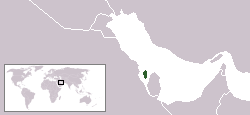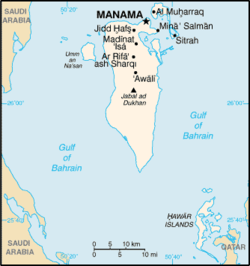History of the Jews in Bahrain
Bahraini Jews constitute one of the world's smallest Jewish communities. Today the community has a synagogue, which though disused is the only one in an Arab Persian Gulf state, and a small Jewish cemetery.[1] Various sources number Bahrain's Jewish community as being from 36 to 50 people.[2] Nancy Khedouri stated that there were 36 Jews in Bahrain.[3] Larry Luxner states that in 2006 there were 36 Jews in Bahrain.[4] As of 2008, 37 Jews were believed to be in the country.[5] According to a 2017 article on Bahrain the number of Jews in Bahrain is about 30.[6] Currently, Bahraini Jews are not allowed to visit Israel, although, officially, Bahrain agreed to cease adherence to the economic boycott of Israel in exchange for a free-trade agreement with the United States in 2004.[3]
اليهود البحرينيون יהודים בחריינים | |
|---|---|
| Total population | |
| 37[1] | |
| Regions with significant populations | |
| Manama, Capital Governorate | |
| Languages | |
| Arabic, Hebrew | |
| Religion | |
| Judaism | |
| Related ethnic groups | |
| Jews (Arab Jews, Iraqi Jews, Yemenite Jews) |


Early history
There are Talmudic references made of a Jewish community dating back in the geographic areas of present-day Bahrain, as well as references in Arabic texts to a Jewish presence in Hajar (eastern coast of inland Arabia) during Mohammed's time.[7]
According to a Jewish Virtual Library entry by Jewish researcher, Ariel Scheib, Jews have lived in what became the modern kingdom of Bahrain since the times of the Talmud. He further stated that it is mentioned in Arabian sources that Jews lived in Hajar, the capital of Bahrain, in 630 CE and refused to convert to Islam, when Muhammad sent an army to occupy the territory.[8]
In the 12th century, Benjamin of Tudela recorded that nearly 500 Jews lived in Qays and that a population of 5,000 resided in al-Qatif. Benjamin also recounted that these Jews controlled the local pearl industry.
Modern times
The modern Bahrain's Jewish community traces its origins to the migration of Iraqi traders from the Jewish Yadgar family in the 1880s.[3]
After World War II, increasing anti-British sentiment spread throughout the Arab World and led to riots in Bahrain. The riots focused on the Jewish community.[9] In 1948, there were 1,500 Jews living in Bahrain, while some sources give the Jewish population as 600 in 1948. On 5 December 1947, riots broke out against the Jewish community in Manama in the wake of ongoing violence in Palestine. A mob looted Jewish homes and shops, destroyed the city's synagogue, physically assaulted Jews, and murdered an elderly Jewish woman.[5] Most members of Bahrain's Jewish community abandoned their properties and evacuated to Bombay, later settling in Israel (Pardes Hanna-Karkur) and the United Kingdom. The 1950 census found 293 Jews in the country.
Houda Nonoo told The Independent newspaper: "I don't think it was Bahrainis who were responsible. It was people from abroad. Many Bahrainis looked after Jews in their houses." This view is supported by Charles Belgrave, formerly a political adviser to the government of Bahrain – which at the time was subject to treaty relations with Britain – who recalled in a memoir: "The leading Arabs were very shocked ... most of them, when possible, had given shelter and protection to their Jewish neighbours... [the riots] had one surprising effect; it put an end to any active aggression by the Bahrain Arabs against the Bahrain Jews." Following the riots, as well as the establishment of Israel and the 1948 Arab-Israeli War, many Bahraini Jews emigrated to Israel, the United States, or United Kingdom. Some 500-600 remained, but after riots broke out in the aftermath of the Six-Day War in 1967, Bahraini Jewry emigrated en masse.[10][11]
Contemporary scene
Jews are one of several communities that form the core of the liberal middle classes and several are even active in politics. A Jewish businessman, Ebrahim Daoud Nonoo, sat on the appointed upper house of the Bahraini Parliament's Shura Council. In 2005, he was replaced by his niece, Houda Ezra Nonoo. Since 2004, Ms. Nonoo also headed the Bahrain Human Rights Watch Society[12] which has campaigned against the reintroduction of the death penalty in the tiny kingdom. Neither is considered a controversial figure, even among Salafist politicians.
As of 2007, the Jewish population of Bahrain numbered 36.[8] At that time, the tolerance extended to the island's Jewish community is the result of the policy of its leader, King Hamad ibn Isa Al Khalifa. The island's boycott of Israeli products was in effect until 2004, when a free-trade agreement with the United States put an end to the official boycott.
Jewish Bahraini author, Nancy Khedouri, wrote From Our Beginning to Present Day[3] about the Bahraini Jewish community:
- ...Bahraini Jews are well integrated into the life of the 700,000-person island kingdom, with Jewish government officials such as former Shura Council member Abraham David Nonoo and Khedouri's own family, Bahrain’s leading importer of tablecloths and linens.[8]
- Khedouri explained, "Most of the Jewish men were traders and the women worked as teachers, nurses, and from the very start developed strong bonds of friendship with the local citizens."
- Ms. Khedouri was quoted by the Gulf News as saying that her book "shows how Bahrain has practiced religious tolerance all these years and how privileged everyone should feel to be living in this beautiful Kingdom, which has always offered and will continue to offer peace and security to all its citizens." In an earlier interview, with the Bahrain Tribune, Khedouri said, "The peaceful co-existence we have with the Bahrainis is proof of the religious tolerance advocated by His Majesty the King, Hamad bin Isa Al-Khalifa."
- ...Before the establishment of the State of Israel, nearly 600 Jews lived in Bahrain, but many fled in the wake of anti-Semitic rioting in 1947-48 and again in 1967. Currently, Bahraini Jews are not allowed to visit Israel, although, officially, Bahrain agreed to cease adherence to the economic boycott of Israel in exchange for a free-trade agreement with the United States in 2004.
At present, there have been no acts of physical violence or harassment of Jews or vandalism of Jewish community institutions, such as schools, cemeteries, or the synagogue. Although the Government has not enacted any laws protecting the right of Jews to religious freedom, Jews practice their faith privately without governmental interference. Nevertheless, the Government has made no specific effort to promote antibias and tolerance education. Some anti-Semitic political commentary and editorial cartoons continue to appear, usually linked to the Israeli-Palestinian conflict.[13]
In 2008, Bahrain's king nominated Houda Nonoo, a Jewish woman who served in the nation's 40-member upper house of Parliament, as its ambassador to the United States.[14]
In November, 2010, Bahraini Jewish author Nancy Khedouri[15] was appointed to replace Nonoo in Parliament.[1]
Beginning in 2015, King al Khalifa officially marked the celebration of Hanukkah, with Jewish and Muslim Bahrainis celebrating together.[16]
See also
- Bahrain–Israel relations
- List of Jews from Bahrain
- Arab Jews
- Arab states of the Persian Gulf
- History of the Jews in the Arabian Peninsula
- History of the Jews under Muslim rule
- Islam and antisemitism
- Jewish exodus from Arab lands
- Jews outside Europe under Nazi occupation
- Judaism and Islam
- List of Jews from the Arab World
- Mizrahi Jews
References
- Chana Ya'ar (28 November 2010). "King of Bahrain Appoints Jewish Woman to Parliament". Arutz Sheva. Retrieved 28 November 2010.
- Habib Toumi (4 April 2007). "Bahrain defends contacts with US Jewish body". gulfnews.com.
- Khedouri, Nancy Elly (2008) From Our Beginning to Present Day Bahrain: Al Manar Press. ISBN 9789990126044.
- Larry Luxner, Life's good for Jews of Bahrain — as long as they don't visit Israel Archived 7 June 2011 at the Wayback Machine, Jewish Telegraphic Agency, 18 October 2006. Accessed 25 October 2006.
- Ratzlav-Katz, Nissan (14 August 2008). "The King of Bahrain Wants the Jews Back". Israel National News. Archived from the original on 3 October 2012. Retrieved 2 October 2012.
- Jewish Virtual Library accessed June 20,2019
- Delew, Burhanaldeen. Jazirat Al-Arab Qabl al-Eslam. Beirut: Dar-alfarabi publishing house, 1989. volume 2, page 219-220
- Nissan Ratzlav-Katz (3 July 2007). "A Book on the History of Bahraini Jews Debuts in the Gulf State (with photo)". Arutz Sheva. Retrieved 31 May 2011.
- Breger, Sarah (2011). "The Unlikely Emissary: Houda Nonoo". Moment. Retrieved 7 July 2012.
- "The Unlikely Emissary: Houda Nonoo". Archived from the original on 3 December 2013. Retrieved 1 December 2013.
- Donald Macintyre (2 November 2007). "Low profile but welcome: a Jewish outpost in the Gulf". London: The Independent. Archived from the original on 4 January 2008. Retrieved 4 May 2010.
- Habib Toumi (4 September 2005). "Bahraini Jewish woman elected rights body head". gulfnews.com. Archived from the original on 19 December 2007. Retrieved 31 May 2011.
- "Bahrain: International Religious Freedom Report 2006". United States Department of State. Retrieved 31 May 2011.
- "Bahrain names Jewish ambassador (with photo)". BBC News. 28 May 2008. Retrieved 31 May 2011.
- Chief, Habib Toumi, Bureau (29 December 2011). "Bahrain King emphasises religious tolerance".
- "King of Bahrain hosts Hanukkah candlelighting".
External links
- Jewish Virtual Library on the Jews of Bahrain